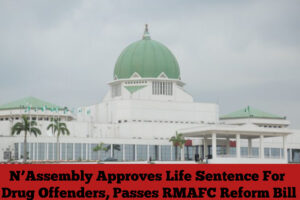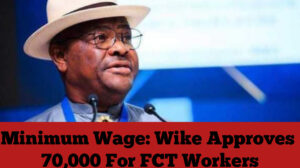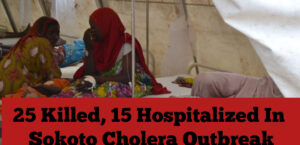The Nigerian Correctional Service (NCOS) on Tuesday urged the Independent National Electoral Commission (INEC) to extend voting rights to inmates to allow them exercise their civic responsibilities as NIgerians.
The Controller General of the NCoS, Haliru Nababa made the appeal when he led management of the service on a visit to the INEC headquarters in Abuja.
Nababa, who was represented by Assistant Comptroller General (ACG), Daniel Odharo, said the meeting with INEC was to work out the modalities for the inmates to vote in the 2023 elections in line with recent court ruling.
“The court recently gave a judgment in favour of inmates voting in elections.
“The modalities to meet the process needs to be worked out and so we need to be here to discuss with INEC to find out how this process can be achieved,” Nababa said.
On his part, INEC Chairman, Prof. Mahmood Yakubu said that the commission was committed to inclusivity including the rights of immates to vote during elections.
Yakubu cited Kenya and South Africa as two countries in Africa that had extended such rights to inmates,
He said while INEC had no issue against inmates voting in Nigeria, there were critical issues that must be considered, saying the Electoral Act 2022 spell out the criteria for registration as a voter include being free and not legally incapacitated.
“Let me start with the legal framework. Section 12(1) of the Electoral Act 2022 lists five qualifications for registration as a voter in Nigeria because you have to register as a voter before the right to exercise that right as a voter is conferred.
“Number one, the prospective registrant must be a Nigerian citizen. Number two, he or she must be 18 at least. Number three, he or she must originate, reside or work in the local government or ward covered by the registration center or the point of registration.
Number four that citizen of Nigeria must present himself or herself to the registration officer for registration as a voter.
“Number five, which is really critical to our discussion today is that he or she must not be subject to any legal incapacity to vote under any law, rule, or regulation imposed in Nigeria.
“So this is one area that we need to discuss so that we know the categories of inmates that will exercise the right to vote .
“We need to work things out carefully. We want transparency of the process. Because everything that we do in the commission, particularly when it comes to the rights of citizens to vote, must be done transparently.”
Yakubu said that there certain questions that must be answered in considering the request such as will the inmates vote outside the prison or inside the prison?
“So are we going to set up polling units inside the prisons or there will be polling units outside the prisons?”
Yakubu said since the majority of inmates are awaiting trial, the Commission believes that some of them are already registered voters, while some are not registered.
“If they are registered voters, they can’t be registered. What they will do is transfer their registration. Will they transfer their registration to the correctional centers for that reason?
“Will political parties be allowed to campaign inside the correctional centers? This is a matter that we need to advise the commission.
“Will observers and the media be allowed access to the correctional centers on election day so that the process is really transparent?
“Will INEC officials be granted access to the correctional centers for voter education? This is a matter that we need to discuss?
“Will election holds in all 218 Federal Correctional centers currently holding inmates nationwide? Or there are some correctional centers where this process can start instead of over 218.
“We understand that some of the correctional centers are not holding inmates at present. So the process be allowed to cover all the 218 centers?
“So these are some of the issues that we need to carefully discuss and resolved before a decision is taken.
“But in principle, the commission is committed to ensuring that all Nigerians are given the right to vote and be voted for but in this particular case, the right to vote, which is exercisable under the law.
“The sooner we are able to address these issues, the better for the process,” Yakubu said.
He said that while the critical thresholds for 2023 may not be met, the two agencies would continue with the discussion on what could happens beyond 2023.
(NAN)




